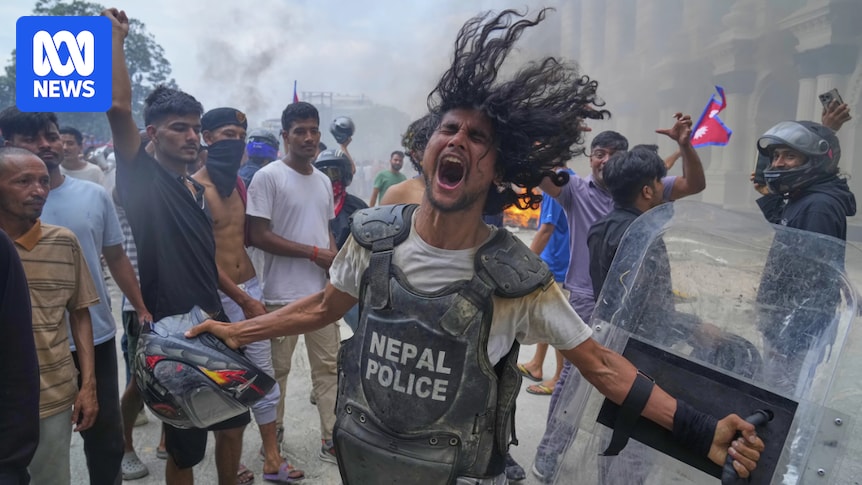
Nepal’s deadliest outbreak of political violence in decades has ushered in a new era for the country. Early last week, predominantly Gen Z protesters took to the streets of Kathmandu and other cities, leading to the resignation of Prime Minister Khadga Prasad Oli on Tuesday. Former Chief Justice Sushila Karki has stepped in as interim prime minister, marking a historic moment as she becomes the first woman to lead the Himalayan nation.
The new interim leadership faces the formidable task of guiding a fractured nation out of its most turbulent period in decades. However, the unrest has left significant damage in and around the capital. Security forces resorted to tear gas and rubber bullets to disperse protesters, some of whom set fire to state buildings, including the Supreme Court, parliament, police posts, politicians’ homes, and private businesses.
Authorities in Nepal have raised the death toll from last week’s unrest to 72, as search teams recover bodies from government offices, houses, and other buildings torched during the anti-corruption protests, according to the health ministry on Sunday.
“Bodies of many people who died in shopping malls, houses, and other buildings that were set on fire or attacked are now being discovered,” health ministry spokesperson Prakash Budathoki stated.
The ministry’s previous death toll was 51, updated as of Saturday. The latest data showed on Sunday that at least 2,113 people had been injured in the violence.
A New Dawn for Nepal
Speaking for the first time since formally taking office on Sunday, Ms. Karki announced that her tenure would not exceed six months, as reported by the BBC. She also pledged that the government would compensate the families of those killed in the unrest with 1 million rupees (approximately $17,000) and provide free treatment to the injured.
The next step for Ms. Karki is to form a cabinet. She began her work in a building close to the prime minister’s office, which was also set ablaze during the protests.
“We must now engage in rebuilding the destroyed structures,” she told senior government officials, as reported by state television.
The unrest has severely impacted Nepal’s already fragile economy. Estimates from hoteliers, auto dealers, and major retailers suggest nearly 10,000 Nepalis lost their jobs overnight as violence spread. The Hotel Association Nepal reported losses amounting to 25 billion Nepalese rupees ($275 million). Durbar Square and other popular tourist destinations, like the hiking favorite Pokhara, remain much quieter than usual, with charred hotels and burned vehicles becoming common sights across the country.
Not Just About Removing One Leader
Protesters in Nepal are demanding comprehensive investigations into a series of high-profile corruption scandals, which they claim have hollowed out the state and enriched political elites. Among the most notorious is the Airbus A330 deal, in which Nepal Airlines purchased two wide-body jets at inflated prices through a murky arrangement.
Activists like Mr. Adhikary have called on the government to establish an independent commission to investigate corruption under the former prime minister.
“There are a dozen plus laws to punish corrupt officials, and there are half a dozen government agencies to curb corruption,” he said.
For many young people, the scandals symbolize a system designed to protect the powerful. Youth social activist Ajit Bhatta emphasized the need for transparency and restoration.
“I think the next step would be to restore these heritage, the public properties which have been damaged,” Bhatta stated. “I think many of the young people are demanding to disclose the property of the previous government leaders. I think this was also necessary.”
Protesters assert that their Gen Z-led movement was not just about removing one leader, but about reforming the system to ensure accountability and protect Nepal’s future.
Implications and Forward-Looking Analysis
The announcement comes as Nepal stands at a crossroads, with the potential for significant political and social reform. The interim government’s actions in the coming months will be crucial in determining the country’s trajectory. Experts suggest that the focus should be on rebuilding trust in public institutions and ensuring transparency in governance.
Meanwhile, the international community watches closely, offering support and urging peaceful resolutions. The move represents a critical opportunity for Nepal to address long-standing issues and pave the way for a more equitable and democratic society.
As Nepal embarks on this new political path, the challenges are immense, but so are the possibilities for meaningful change. The world will be watching as the nation navigates this pivotal moment in its history.






